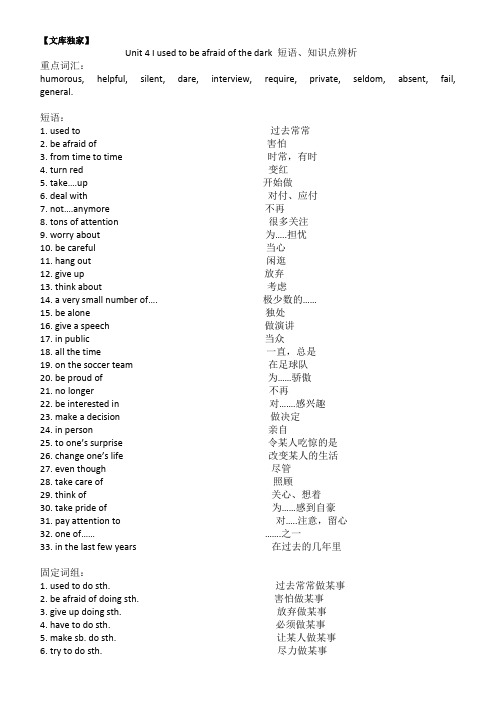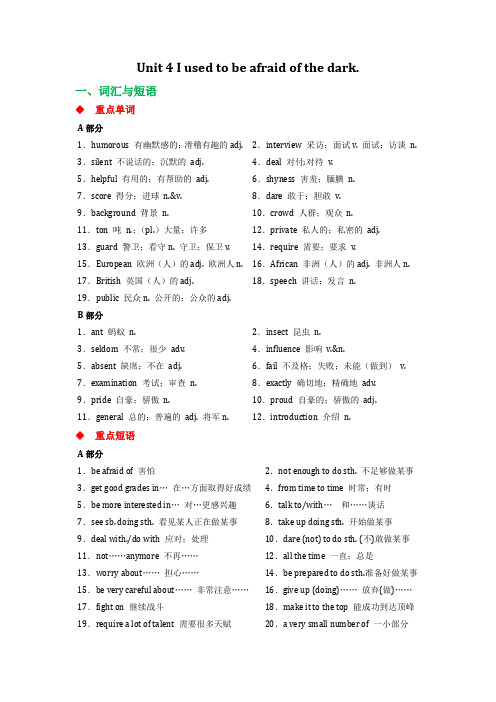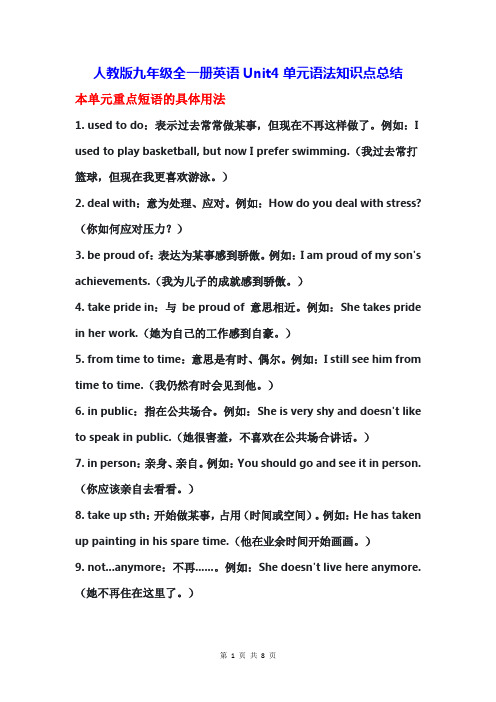2020年人教版英语九年级Unit4知识点总结整理
人教版九年级英语Unit4知识点梳理及语法讲义(教师版)

—What’s he like?他是什么样的人?
—He’s outgoing.他是外向的。
【拓展延伸】
(1)“What does sb. look like?”意为“某人长什么样?”,只能用来提问人的外貌,不能用来提问人的性格、品质等。其中like是介词,意为“像”。
13. examination(n.考试) —examine(v.考试;审查)
14. exactly(adv.确切地)—exact(adj.精确的)
15. pride(n.骄傲;自豪)—proud(adj.自豪的;骄傲的)
16. general(adj.总的;普遍的)—generally(adv.通常地)
【注意】陈述句和附加问句在人称、数和时态上必须保持一致,
且附加问句的主语必须为代词。
【拓展延伸】反意疑问句的答语
(1)反意疑问句的答语应符合事实。事实是肯定的用yes,事实是否定的用no
(2) 当句式是“前否后肯”的结构时,翻译要以事实为依据,yes翻译为“不是”,no翻译为“是的”
►—Sheisa student,isn’tshe?她是一个学生,不是吗?
3. help(n/v.帮助) —helpful(adj.有帮助的)—helpless(adj.没有帮助的)
4. interview(v.采访;面试) —interviewer(n.采访者)
5. Asia(n.亚洲)—Asian()
6. deal(v.对付;对待) —dealt(过去式/过去分词)
7. shy(adj.害羞的) —shyness(n.害羞;腼腆)
【用法详解】
(1)
(2)19yearold意为“19岁的”(重点)
2020人教版九年级英语上Unit4课文重难点讲解与练习

【文库独家】Unit 4 I used to be afraid of the dark 短语、知识点辨析重点词汇:humorous, helpful, silent, dare, interview, require, private, seldom, absent, fail, general.短语:1. used to 过去常常2. be afraid of 害怕3. from time to time 时常,有时4. turn red 变红5. take….up 开始做6. deal with 对付、应付7. not….anymore 不再8. tons of attention 很多关注9. worry about 为…..担忧10. be careful 当心11. hang out 闲逛12. give up 放弃13. think about 考虑14. a very small number of…. 极少数的……15. be alone 独处16. give a speech 做演讲17. in public 当众18. all the time 一直,总是19. on the soccer team 在足球队20. be proud of 为……骄傲21. no longer 不再22. be interested in 对…….感兴趣23. make a decision 做决定24. in person 亲自25. to one’s surprise 令某人吃惊的是26. change one’s life 改变某人的生活27. even though 尽管28. take care of 照顾29. think of 关心、想着30. take pride of 为……感到自豪31. pay attention to 对…..注意,留心32. one of………….之一33. in the last few years 在过去的几年里固定词组:1. used to do sth. 过去常常做某事2. be afraid of doing sth. 害怕做某事3. give up doing sth. 放弃做某事4. have to do sth. 必须做某事5. make sb. do sth. 让某人做某事6. try to do sth. 尽力做某事7. adj. + enough to do sth. 足够……而能做某事8. be prepared to do sth. 准备做某事9. see sb. doing sth. 看见某人在做某事10. take up doing sth. 开始做某事11. begin to do sth. 开始做某事12. require sb. to do sth. 要求某人做某事13. decide to do sth. 决定做某某14. make a decision to do sth. 决定做某事15. It’s hard to believe that……很难相信……….16. It has been + 一段时间+ since + 从句自从……以来已经有很长的时间了17. dare to do sth. 敢于做某事18. It’s + adj. + for sb. + to do sth. 对某人来说做某事是……的重点句型:1. I used to be afraid of the dark. 我过去常常怕黑。
2020-2021学年人教版英语九年级 Unit4 知识点整理

Unit 4知识点P25ed to do sth.过去常常做某事be used to doing sth.习惯于做某事He used to get up late,but now he is used to getting up early.他过去常常起床很迟,但是现在习惯于早起。
I used to be afraid of the dark.我过去害怕黑暗。
ed to do sth.中used 不随主语的变化而变化。
Mario, you used to be short ,didn’t you ? Mario,你过去很矮,不是吗?Yes,I did./No, I didn’t.(依据事实来答)3.What’s sb like ?可用来提问人的相貌,也可用来提问人的性格、品质。
而What does sb look like?只用来提问相貌What’s your math teacher like?既可以回答:He’s tall and thin.也可以说He’s outgoing.What does your sister look like?-She’s of medium build with short hair.她中等身材,留着短发。
P264.humorous adj.有幽默感的、滑稽有趣的serious adj.严肃的;重大的;认真的;严重的5.silent adj.不说话的,沉默的be /keep /stay siltent 保持沉默silently adv. She was always silent in class.她在课堂上总是不说话。
in silence 安静地,无声地He walked into the room in silence.She got good grades in silence.她默默地取得了好成绩。
6.helpful adj. 有帮助的;有用的a helpful suggestion 一条有用的建议be helpful to sb. 对某人有用a helpful child 一个乐于助人的小孩7.from time to time 时常;有时=sometimes =at timesShe still plays the piano from time to time.=At times she still plays the piano.8.such /so①such+a/an+adj.+n.(单数)=so+adj.+a/an+n.(单数)such a nice coat=so nice a coatsuch a happy childhood 如此快乐的一段童年时光①such +adj.+n.(pl.)/不可数名词such nice coats①so many/much/little /fewso many mistakes 这么多错误such a great idea 如此好的一个主意=so great a idea9.It’s been three years since we last saw our primary school classmates.自从上次我们小学同学见面已经三年了。
人教版九年级英语u4知识点

人教版九年级英语u4知识点Unit 4: Our WorldIntroduction:In the ninth grade English curriculum, Unit 4 revolves around expanding students' knowledge about the world around them. The unit covers various topics, including environmental issues, cultural diversity, global communication, and scientific advancements. By exploring these areas, students will not only enhance their English language skills but also broaden their perspectives on the world.Environmental Issues:One of the focal points of Unit 4 is environmental issues. Students learn about the pressing problems our planet faces, such as pollution, deforestation, and climate change. They are encouraged to think critically about the causes and consequences of these issues and explore possible solutions. Through this discussion, students develop a sense of responsibility towards the environment and learn how their actions can contribute to preserving it.Cultural Diversity:Another significant aspect of Unit 4 is cultural diversity. Students investigate different cultures, traditions, and customs from around the world. This exploration helps them appreciate the rich and diverse tapestry of humanity. They learn about festivals, music, art, and clothing, gaining a better understanding of cultural uniqueness and promoting tolerance and acceptance.Global Communication:Unit 4 also emphasizes the importance of global communication in today's interconnected world. Students explore various means of communication, such as social media, email, and video conferencing. They discuss the advantages and challenges of communicating across cultural and linguistic barriers. By learning effective communication skills, students can bridge cultural gaps and foster meaningful connections with people from different backgrounds.Scientific Advancements:Lastly, Unit 4 introduces students to significant scientific advancements that have shaped our world. They learn about breakthroughs in fields like medicine, technology, and space exploration. By understanding these advancements, students realize the immense potential of scientific discovery in solving global challengesand improving lives. They are encouraged to develop an interest in scientific exploration and possibly pursue careers in scientific research.Conclusion:Unit 4 of the ninth grade English curriculum offers students a comprehensive understanding of the world they inhabit. By covering environmental issues, cultural diversity, global communication, and scientific advancements, students gain knowledge that extends beyond the boundaries of their textbooks. They develop a sense of global citizenship, empathy towards others, and critical thinking skills necessary to thrive in an increasingly interconnected world. Through this unit, students broaden their horizons and become more open-minded individuals who are aware of the challenges and opportunities our world holds.。
最全面人教版九年级英语全册第四单元知识点归纳总结

Unit 4 I used to be afraid of the dark.一、词汇与短语◆重点单词A部分1.humorous 有幽默感的;滑稽有趣的adj.2.interview 采访;面试v. 面试;访谈n. 3.silent 不说话的;沉默的adj.4.deal 对付;对待v.5.helpful 有用的;有帮助的adj.6.shyness 害羞;腼腆n.7.score 得分;进球n.&v.8.dare 敢于;胆敢v. 9.background 背景n.10.crowd 人群;观众n.11.ton 吨n.;(pl.)大量;许多12.private 私人的;私密的adj. 13.guard 警卫;看守n. 守卫;保卫v.14.require 需要;要求v. 15.European 欧洲(人)的adj. 欧洲人n.16.African 非洲(人)的adj. 非洲人n. 17.British 英国(人)的adj.18.speech 讲话;发言n.19.public 民众n. 公开的;公众的adj.B部分1.ant 蚂蚁n.2.insect 昆虫n.3.seldom 不常;很少adv.4.influence 影响v.&n.5.absent 缺席;不在adj.6.fail 不及格;失败;未能(做到)v. 7.examination 考试;审查n.8.exactly 确切地;精确地adv. 9.pride 自豪;骄傲n.10.proud 自豪的;骄傲的adj. 11.general 总的;普遍的adj. 将军n.12.introduction 介绍n.◆重点短语A部分1.be afraid of 害怕2.not enough to do sth. 不足够做某事3.get good grades in…在…方面取得好成绩4.from time to time 时常;有时5.be more interested in…对…更感兴趣6.talk to/with…和……谈话7.see sb. doing sth. 看见某人正在做某事8.take up doing sth. 开始做某事9.deal with./do with 应对;处理10.dare (not) to do sth. (不)敢做某事11.not……anymore 不再……12.all the time 一直;总是13.worry about……担心……14.be prepared to do sth.准备好做某事15.be very careful about……非常注意……16.give up (doing)……放弃(做)……17.fight on 继续战斗18.make it to the top 能成功到达顶峰19.require a lot of talent 需要很多天赋20.a very small number of 一小部分21.eat a lot of vegetables 吃大量的蔬菜22.listen to pop music 听流行音乐23.watch scary movies 看恐怖片24.at least 至少25.in public公开地;在别人(尤指生人)面前26.tons of许多的;大量27.give a speech 做演讲28.a number of许多;大量B部分1.make a decision做决定2.in person亲身;亲自3.even though即使;尽管4.take care of 照顾;照料5.be absent from 缺席;不在6.paint pictures 画画7.take pride in…为…感到自豪8.music classes 音乐课9.be proud of…为…骄傲;感到自豪10.on the soccer team 在足球队11.do well in……在……方面做得好12.work hard 学习努力13.make friends with sb. 和某人交朋友14.take care of/look after 照顾15.move to……搬到……16.feel lonely 感到孤独17.be absent from classes 旷课18.a boarding school 一所寄宿学校19.fail the exams/examinations 考试不及格20.advise sb. to do sth.建议某人做某事21.send…to…派……到……;送……到……22.look for 寻找23.have a great influence on sb. 对某人有很大影响◆重点句子A部分1.Mario, you used to be short, didn't you? 马里奥,你过去很矮,不是吗?2.It's been three years since we last saw our primary school classmates.我们上次见到小学同学已经三年了。
人教版九年级全一册英语Unit4单元语法知识点总结

人教版九年级全一册英语Unit4单元语法知识点总结本单元重点短语的具体用法1. used to do:表示过去常常做某事,但现在不再这样做了。
例如:I used to play basketball, but now I prefer swimming.(我过去常打篮球,但现在我更喜欢游泳。
)2. deal with:意为处理、应对。
例如:How do you deal with stress?(你如何应对压力?)3. be proud of:表达为某事感到骄傲。
例如:I am proud of my son's achievements.(我为儿子的成就感到骄傲。
)4. take pride in:与be proud of 意思相近。
例如:She takes pride in her work.(她为自己的工作感到自豪。
)5. from time to time:意思是有时、偶尔。
例如:I still see him from time to time.(我仍然有时会见到他。
)6. in public:指在公共场合。
例如:She is very shy and doesn't like to speak in public.(她很害羞,不喜欢在公共场合讲话。
)7. in person:亲身、亲自。
例如:You should go and see it in person.(你应该亲自去看看。
)8. take up sth:开始做某事,占用(时间或空间)。
例如:He has taken up painting in his spare time.(他在业余时间开始画画。
)9. not...anymore:不再......。
例如:She doesn't live here anymore.(她不再住在这里了。
)10. worry about:担心、担忧。
例如:Don't worry about the exam, just do your best.(不要担心考试,尽力就好。
人教版九年级英语unit4知识点

九年级unit4知识点1.humor n. 幽默humorous adj. 有幽默感的,有趣儿的2. silent adj. 不说话的,沉默的keep silent,保持沉默silence n. 沉默,无声in silence 沉默,无声3. helpful adj. 有用的,有帮助的be helpful to sb 对某人有帮助eg: The book is helpful to the students.4. from time to time 时常, 有时= sometimes = at times5. Asian adj. 亚洲的, 亚洲人的, 亚洲人Asia n. 亚洲6. deal with = do with (deal with用how提问,do with 用what提问)7. shy adj. 害羞的shyness n. 害羞,腼腆8. dare to do sth 敢于做某事eg: We must dare to think speak and act.9. crowd n. 人群, 观众crowded adj. 拥挤的uncrowded adj. 不拥挤的, 人少的10. tons of 许多的,大量的= lots of= a lot of= a number ofeg: She gets tons of male every day.11. private adj. 私人的, 秘密的= personal12. require sb to do sth 要求某人做某事eg: The teacher required the students to be quiet.13. Europe n. 欧洲European adj. 欧州的,欧洲人的, 欧洲人14. Africa n. 非洲African adj. 非洲的, 非洲人的, 非洲人15. give a speech 演说, 演讲eg: They invited him to give a speech.16. in public 公开地eg: It's impolite to speak loudly in public.17. influence v. influnce sb to do sth 影响某人使其做某事influence n. 影响have an influence on sb 对人有影响eg: His idea had a great influence on me.18. be absent from 缺席eg: They were absent from work that day.absent adj. absence n.19. fail to do 未能做某事eg: I failed to pass the driving test.20. in person 亲身, 亲自21. be proud of = take pride in 为...自豪, 感到骄傲。
人教版九年级英语unit4语法知识点

人教版九年级英语unit4语法知识点人教版九年级英语Unit 4语法知识点在英语学习中,语法是非常重要的一部分。
掌握语法知识可以帮助我们正确理解和运用英语。
本文将介绍人教版九年级英语Unit 4的语法知识点,帮助大家更好地学习和应用。
一、现在完成时现在完成时用来表示过去发生的动作对现在的影响或结果。
它的结构是主语 + have/has + 过去分词。
例句:1. I have finished my homework.(我已经完成作业。
)2. He has gone to the supermarket.(他已经去超市了。
)我们可以使用现在完成时来描述过去发生的事情对当前状态的影响。
比如 "I have lost my key."(我丢了我的钥匙)表示我现在没有钥匙。
二、情态动词情态动词用来表示说话者对某个动作或状态的态度、可能性、允许性等。
常见的情态动词有 can, could, may, might(可以)、must(必须)、shall, should(应该)、will, would, need等。
例句:1. You can go to the party.(你可以去参加派对。
)2. He must finish his homework before playing games.(他必须先做完作业再玩游戏。
)情态动词有一些特点:后面接动词原形,表示客观的态度或可能性;情态动词本身没有人称和数的变化;句子中情态动词和动词基本形的变化最小。
三、虚拟语气虚拟语气用来表示非真实或假设的情况。
在条件从句中,用虚拟语气来表示可能不会实现的愿望、假设或建议等。
常见的虚拟语气形式有:would/could/might +动词原形。
例句:1. If I were a bird, I would fly in the sky.(如果我是一只鸟,我会在天空飞翔。
)2. I wish I could go with you.(我希望我能和你一起去。
- 1、下载文档前请自行甄别文档内容的完整性,平台不提供额外的编辑、内容补充、找答案等附加服务。
- 2、"仅部分预览"的文档,不可在线预览部分如存在完整性等问题,可反馈申请退款(可完整预览的文档不适用该条件!)。
- 3、如文档侵犯您的权益,请联系客服反馈,我们会尽快为您处理(人工客服工作时间:9:00-18:30)。
2020年人教版英语九年级Unit 4 I used to be afraid of the dark.语法used to 的用法1.“used to do sth”意为“过去常常做某事”,表示过去的习惯动作或状态,现在/已不发生或不存在。
She used to be thin,but now she is fat.The young man used to wear glasses,but now he doesn’t wear glasses.2.带used to的句子的各种句式的构成:(1)肯定句的构成是:主语+ used to do sth.—He used to play basketball after school.(2)否定句的构成是:主语+ didn’t use to do sth.She didn’t use to have long hair.(3)一般疑问句构成是: Did+主语+use to do sth肯定回答是:Yes,主语+did#否定回答是:No,主语+didn’tDid he use to play the piano Yes,he did/ No,he didn’t(4)反意疑问句的构成是:didn’t+主语She used to be very thin, didn’t she3.妙用异同#(1)used to do sth.表示过去习惯性的动作或经常性的状态.He used to smoke,didn’t he(2)be used to doing sth表示“习惯于做某事”My parents are used to getting up early.(3)be used to do sth=be used for doing sth是被动结构,表示“被用来做某事”%The knives are used to cut things.=The knives are used for cutting things. (1)—Wow! You look different! You wear glasses.—Yes,I did. But now I am wearing contact lenses(隐形眼镜)B. must to(2) When I was a child, I used to ___________ strawberry.]A. likingB. likeC. likedD. likes(3)___________ study in Middle SchoolA. Did you used toB. Did you use toC. Do you used toD. Do you use to(4)She used to with her parents, but now she is used to___with her classmatesat school.A. live; living ; live ; living ; live(5)Mother used to grow flowers in her garden.(改为否定句)Mother grow flowers in her garden."(6)The little girl often wore a skirt in the past.(同义句)The little girl a skirt.(7)You used to be very strong, (完成反意疑问句)反意疑问句的用法1.含义、构成和回答#①反意疑问句也叫附加疑问句, 反意疑问句表示说话人对所陈述的事情有所怀疑或不肯定,想通过对方的回答来加以肯定或否定。
②它的结构由两部分组成:陈述句+简短问句。
如果前一部分为肯定形式,后一部分用否定形式;前一部分为否定形式,后一部分就用肯定形式。
也就是说反意疑问句要遵循“前肯后否,前否后肯”的原则。
③反意疑问句的回答和一般疑问句的回答是一样的。
Mary likes reading,doesn’t sheMary doesn’t like reading,does sheYes,she ,she doesn’tYou’re a new student,aren’t youYou aren’t a new student,are you"Yes,I ,I’m not(1)John had a short walk after lunch,he B. didn’t he he ’t he(2)There isn’t any water in the bottle,it there ’t it ’t there,(3)She’s come back, __________ sheA. isB. isn’tC. hasD. hasn’t2.反意疑问句应注意三点:(1)除了no,not以外的其他否定词有never(从不),nothing(没有什么),few(几乎没有),little(几乎没有),hardly(几乎不),seldom(不常,很少)而unhappy(不高兴的),uncrowded(不拥挤的),dislike(不喜欢)等不是否定词。
She has few friends,does she Yes,he does.-Jim never goes to the movies on Saturday,Jim ’t Jim ’t he he(2)祈使句的反意疑问句,一般在句末用will you(包括以Let us开头的祈使句);而以let’s开头的祈使句,其反意疑问句是shall weLet’s go out for a walk,shall we Let us go out for a walk,will youDon’t drink too much,will you>You’ve just finished your listening get yourself ready for the next part,we you you you(3)对反意疑问句的回答,不管问题的提法如何,如果事实是肯定的,就要用yes;事实是否定的,就要用no.(1)—Hawk isn’t at school today,is he—.I met him in the classroom just now./,he isn’t B. Yes,he is ,he isn’t ,he is(2)—You haven’t been to Sanya, have you—__________. How I wish to go there!A. Yes, I haveB. No, I haven’tC. No, I haveD. Yes, I haven’t(3)—’s never been to Canada, has he】—.He went there on business last week.,he hasn’t ,he has ,he has ,he hasn’tSection A1.区分be like和look like(1)be like多用于描述人的性格、品质等,也可以提问外表'—What’s Alice like—She is quiet and a little shy.(2)look like只用来描述人的长相、外貌。
—What does your father look like —He is very tall and fat.silent意为“保持沉默”意为“有用的,有帮助的”。
be helpful to sb/sth“对某人/某物有帮助”;My teacher gave me lots of helpful books in math.4.形容词/副词+enough 意为“足够……的”He runs quickly enough.We have enough time to do our homework.The dining hall is to hold(容纳) 300 people.}big small enough enough5. too…to…常和not…enough to及so…that…进行同义句转换He is too young to go to school.=He isn’t old enough to go to school.=He is so young that he can’t go to school.(1)The problem is too difficult for me to work out.(改为同义句)The problem isn’t for me to work out./(2)She’s not strong enough walking up mountains.gotime to time意为“时常,有时”From time to time he gave him a encouraged nod.后接一般过去时的从句,看见since后接一般过去时的从句,要用现在完成时。
…(1)She has taught us English since I (come) to this school.(2)My uncle (teach) in this school since he was twenty years old.8.辨析:become,turn,get 和go(1)become通常指身份、职位的变化She became an English teacher.~(2)turn指颜色或性质的变化The leaves in the trees turn yellow in autumn.(3)get多用于口语,表示一种变化的过程,强调“渐渐变得”,其后常接形容词的比较级。
The days are getting longer and longer in summer.(4)go指食物变质,腐烂(1)He a player when he was 18.:A. turnedB. becomesC. becameD. get(2)The food bad,it smells terrible.A. turnsB. becomesC. goesD. get(3)What can she do to famousA. makeB. takeC. getD. become…9.(1)see sb doing sth.意为“看见某人正在做某事”I saw him playing football on the playground.(2)see sb do sth意为“看见某人做过了某事或看见某人经常做某事”,指看见动作发生的全过程。
